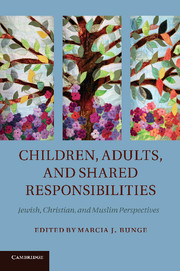Book contents
- Frontmatter
- Contents
- List of Contributors
- Acknowledgments
- Introduction
- PART I RELIGIOUS UNDERSTANDINGS OF CHILDREN
- PART II RESPONSIBILITIES OF CHILDREN AND ADULTS
- Chapter 9 Work, labor, and chores
- Chapter 10 Honor your father and your mother
- Chapter 11 Will I have Jewish grandchildren?
- Chapter 12 Linking past and present
- Chapter 13 Orphans and adoption
- Chapter 14 Second-hand children
- Chapter 15 Christianity's mixed contributions to children's rights
- Chapter 16 Children's rights in modern Islamic and international law
- Select bibliography
- Index of names
- Index of subjects
- References
Chapter 12 - Linking past and present
Educating Muslim children in diverse cultural contexts
from PART II - RESPONSIBILITIES OF CHILDREN AND ADULTS
Published online by Cambridge University Press: 05 October 2012
- Frontmatter
- Contents
- List of Contributors
- Acknowledgments
- Introduction
- PART I RELIGIOUS UNDERSTANDINGS OF CHILDREN
- PART II RESPONSIBILITIES OF CHILDREN AND ADULTS
- Chapter 9 Work, labor, and chores
- Chapter 10 Honor your father and your mother
- Chapter 11 Will I have Jewish grandchildren?
- Chapter 12 Linking past and present
- Chapter 13 Orphans and adoption
- Chapter 14 Second-hand children
- Chapter 15 Christianity's mixed contributions to children's rights
- Chapter 16 Children's rights in modern Islamic and international law
- Select bibliography
- Index of names
- Index of subjects
- References
Summary
A recent report pointedly entitled Education Emergency: Pakistan highlights the crisis facing childhood education within contemporary Pakistani society. One could make the case that the dilemmas listed in the report hold equally for many other Muslim countries, particularly those facing dramatic population growth and development challenges. Several other studies commissioned by the United Nations Development Program (UNDP) for Arab states also reinforce this notion of failure and crisis. In particular, all these studies disclose setbacks in literacy (especially among females), inadequate schools and resources, and a general lack of attention to the educational needs of children. These trends have led to great inequities in educational attainment and a marginalization of poor or rurally based children. One major consequence, as the report on Pakistan claims, is that an increasing number of children do not even have access to schooling, thereby undermining their ability to thrive and their long-term chances for socio-economic stability.
Of course, a small number of select children do have access to quality education in many Muslim countries and go on to form an educated elite, but, relatively speaking, increasing numbers of children are simply denied any meaningful educational opportunities because of poverty, neglect, and inadequate state policies. While in some parts of the Muslim world, we have witnessed a steady growth in traditional madrasas (literally, “places of study”), the politicization of many of these madrasas and a narrow, ideological bent have meant that in some parts of the world they are unable to contribute effectively and sustainably to children's quality of life.
- Type
- Chapter
- Information
- Children, Adults, and Shared ResponsibilitiesJewish, Christian and Muslim Perspectives, pp. 219 - 236Publisher: Cambridge University PressPrint publication year: 2012



